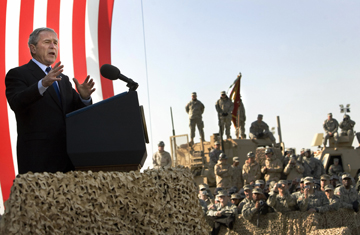
US President George W. Bush gestures as he speaks to military personnel and coalition forces during a visit to US Camp Arifjan, 35 miles south of Kuwait City on Jan. 12, 2008.
On his grand tour of the Middle East, George Bush was far away from the ground wars of the U.S. presidential campaign. Indeed, thanks to the success of the U.S. military surge, the war he started in Iraq is now a second-tier issue in American politics. But Iraq may become a resurgent factor in the strategies of those who want to succeed him in office. The "good news" of the surge and tentative steps forward in Iraqi internal politics may weigh on how voters view the politicians maneuvering to become the next President of the United States.
On Saturday, the current President stopped at the 3rd Army's Camp Arifjan in Kuwait to get a briefing on the war from Gen. David Petraeus and U.S. Ambassador to Iraq Ryan Crocker, and to do some morale-boosting with the troops. He made the most the timing: his visit came just over a year since he announced the troop surge, and he reminded his audience that last year's strategy shift was initially scorned in the U.S. but has turned out to be remarkably effective. At the dusty rally with troops, flanked by an enormous American flag, Bush projected that success out into the future, saying history will judge that "victory was achieved by the U.S. military [in Iraq] for the good of the world."
The event was paralleled in Iraq with a political breakthrough of sorts: the parliament's unanimous passage of a law that allows former members of Saddam Hussein's Baath party to take government jobs for which they have expertise and experience. The so-called de-Baathification of the Iraqi government after the fall of Saddam contributed significantly to the violent sectarian divisions of the country as well as to a collapse in the way the country was run. The new law is meant heal the rift between the Shi'ites who now dominate the government and the Sunnis who used to. "I come with an upbeat message," Bush said at the news of the passage of the Accountability and Justice law. It is, he said, "an important step towards reconciliation... an important sign that the leaders of that country must work together to meet the aspirations of the Iraqi people."
While Bush spoke of history's judgment, the short term may be more important right now for most Americans. If the last year in Iraq has changed the course of the war and the region's future, the next year in that country may determine who will succeed Bush in the White House. Petraeus and Crocker have started an analysis that will determine the troop levels through the heat of the election season from July through November. The success of the surge has diminished the role of Iraq in the U.S. campaign; but the political — and electoral — ramifications of the next decision on troop levels remain an open question. Bush even said Saturday that the current draw down, which is expected to bring troops to pre-surge levels by July, and as low as 100,000 by the end of the year, could be reversed if Petraeus decides he needs to beef back up.
There are at least two views of what the effects on the presidential campaign will be of Petraeus' decision in the spring. One says that further troop reductions will help those who have been relatively hawkish compared to the rest of their parties — including Hillary Clinton and John McCain. (Any Democrat is likely to benefit if violence requires an increase in troops or if the current draw down is halted.) Another says that the lower the violence in Iraq, the better for candidates who have relatively less experience on foreign and national security policy, like Barack Obama and Mike Huckabee, because the issue becomes less important to voters.
The plan for troop reductions between now and July appears to be on track for now. From the 20 combat brigades that were in place at the height of the surge last summer, five will come out and not be replaced. "These improvements [in security in Iraq] are allowing some U.S. forces to return home — a return on success that has now begun," Bush said at the rally Saturday. Beyond that, Bush said, a decision on further troop withdrawals will rest with Petraeus.
Further reductions are not a foregone conclusion. According to Petraeus' spokesman, Col. Steven Boylan troop levels could hold at the July level or could drop, depending on how things stand over the next three months. Violence levels are an important factor, but so is the Iraqi ability to take over security from the American troops. Iraqi security forces have the nominal lead in nine of 18 provinces, having recently taken over from the British in Basra. A proposal to hand over security to Iraqi forces in Anbar this spring is now being considered. Anbar province has been the U.S. military's prize example in the dramatic suppression of the radical Islamists of Al Qaeda in Iraq.
